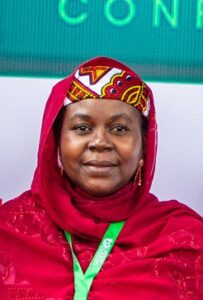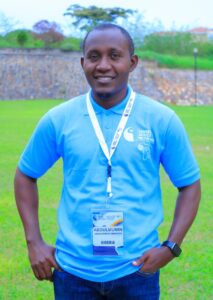Benedict Nwogoh
Dr. Benedict Nwogoh is a Consultant Hematologist at the

University of Benin Teaching Hospital (UBTH), Benin City, Nigeria and an Associate Professor of Hematology at the Department of Hematology, University of Benin, Benin City, Nigeria.
He is a medical graduate of Abia State University, Uturu, Abia State Nigeria. He did his postgraduate training in the Department of Hematology, University of Benin, Benin City and obtained his Fellowship from the National Postgraduate Medical College of Nigeria, Faculty of Pathology and the West African College of Physician, Faculty of Laboratory Medicine. Dr. Nwogoh also had postgraduate training in Dissemination and Implementation Science from the University of Maryland Baltimore, USA. He has worked as a medical consultant and faculty member with the University of Calabar Teaching Hospital, Calabar and presently with UBTH, Benin City. He invests time in mentoring and organizing preparatory classes for resident doctors in the speciality of Hematology.
His research interests include Haemostasis/Thrombosis, Transfusion Medicine and Haemopoietic Stem Cell Transplant. He was a member of the team that pioneered Haemopoietic Stem Cell Transplant in UBTH, Benin City. He has over 50 publications in local, national, and international journals. He was the acting head of the Department of Haematology and Blood Transfusion, UBTH, Benin City between June 2019 and June 2021. He has also served as a Chair of the Blood Management Committee, UBTH, Benin City.
He is a member of:
- College of Nigerian Pathologists
- Nigerian Society of Hematology and Blood Transfusion
- Nigerian Medical Association
- Medical and Dental Consultants Association of Nigeria
- International Society of Thrombosis and Haemostasis
Google Scholar Page: https://scholar.google.com/citations?user=EcyXH8EAAAAJ
ResearchGate Page: https://www.researchgate.net/profile/Benedict-Nwogoh-2
Pubmed Page: https://www.ncbi.nlm.nih.gov/pmc/?term=Nwogoh+Benedict
LinkedIn Page: https://www.linkedin.com/in/benedict-nwogoh-38636016a/
Zubaida Farouk
 Dr. Zubaida Farouk has a medical degree from Ahmadu Bello University Zaria and is a past Fogarty scholar with an MSc in Implementation Science from the University of Maryland Baltimore. Dr. Farouk is a Fellow of the West African College of Physicians; she holds the positions of Deputy Director of the Centre for Infectious Diseases Research at Bayero University Kano and Consultant Physician with Aminu Kano Teaching Hospital.
Dr. Zubaida Farouk has a medical degree from Ahmadu Bello University Zaria and is a past Fogarty scholar with an MSc in Implementation Science from the University of Maryland Baltimore. Dr. Farouk is a Fellow of the West African College of Physicians; she holds the positions of Deputy Director of the Centre for Infectious Diseases Research at Bayero University Kano and Consultant Physician with Aminu Kano Teaching Hospital.
Dr. Farouk is a pediatrician with a background in implementation science. She has been involved in research and clinical care of children, particularly neonates. Dr. Farouk also teaches undergraduate and postgraduate students at Bayero University Kano.
Dr. Farouk’s research interests primarily revolve around child health. She is particularly interested in neonatal conditions, childhood nutrition, and implementation research. Specifically, she has done research and published on topics related to hyperbilirubinemia and bilirubin encephalopathy (ABE). She has focused on the persistence of ABE in Nigeria due to cultural practices such as the use of henna, home delivery, and delayed care-seeking. Additionally, she has collaborated on the development of a mobile phone transcutaneous bilirubinometer. Her research also highlights the diagnostic utility of Brainstem Auditory Evoked Response (BAER) and Bilirubin Induced Neurologic Dysfunction (BIND) score in detecting ABE, especially in regions where BAER is not readily available. Dr. Farouk has also explored the role of socio-cultural determinants in disease burden within rural communities in Kano.
Dr. Farouk is a member of:
- West African College of Physicians
- Nigerian Society of Neonatal Medicine
- Paediatric Association of Nigeria
- Nigeria Medical Association
- Medical and Dental Consultant association of Nigeria
- Medical Women’s Association of Nigeria
- African Perinatal Society.
ResearchGate profile: https://www.researchgate.net/profile/Zubaida-Farouk
Google scholar profile: https://scholar.google.com/citations?hl=en&user=bNiP9bYAAAAJ
ORCID number: orcid.org/0/0000-0003-3984-9354
PubMed profile: https://pubmed.ncbi.nlm.nih.gov/?term=zubaida+farouk&sort=date&size=100https://www.ncbi.nlm.nih.gov/myncbi/zubaida.farouk.1/bibliography/public/
Sophia Osawe
 Dr. Osawe is a Senior Manager at the International Research Center of Excellence (IRCE) of the Institute of Human Virology, Nigeria. She is currently the Head of the Quality Assurance Unit at IRCE, the Research Hub manager for NIH-funded the Role Of Data Streams In Informing Infection Dynamics In Africa (INFORM Africa) research hub, a Senior Technical Advisor on Accreditation and Molecular diagnostics for the CDC-funded AMPLIFY project (a lab strengthening project in Malawi), the Laboratory Advisor and Project Lead for the CDC-funded Strengthening Global Health Security Agenda in Nigeria (SECURE Nigeria) sero-prevalence surveys and the Senior technical advisor for the ISO 15189 accredited laboratory in Plateau State Human Virology Research Center (PLASVIREC). Dr. Osawe has over 15 years’ experience in diagnostics, research, implementation of science projects and quality management systems.
Dr. Osawe is a Senior Manager at the International Research Center of Excellence (IRCE) of the Institute of Human Virology, Nigeria. She is currently the Head of the Quality Assurance Unit at IRCE, the Research Hub manager for NIH-funded the Role Of Data Streams In Informing Infection Dynamics In Africa (INFORM Africa) research hub, a Senior Technical Advisor on Accreditation and Molecular diagnostics for the CDC-funded AMPLIFY project (a lab strengthening project in Malawi), the Laboratory Advisor and Project Lead for the CDC-funded Strengthening Global Health Security Agenda in Nigeria (SECURE Nigeria) sero-prevalence surveys and the Senior technical advisor for the ISO 15189 accredited laboratory in Plateau State Human Virology Research Center (PLASVIREC). Dr. Osawe has over 15 years’ experience in diagnostics, research, implementation of science projects and quality management systems.
Dr. Osawe obtained her BSc (Hons) in Microbiology from the University of Jos. Her postgraduate academic training includes an associate in medical laboratory science from the Federal College of Veterinary and Laboratory Medicine, a master’s in public health from the Manchester Metropolitan University, UK, a Master’s in Business Administration with a specialization in Clinical Research Management from the Indian School of Management and Research and a PhD in Medical Microbiology and Immunology from the University of Jos. She is a registered member of the Nigerian Medical Laboratory Science Council of Nigeria.
She has coordinated observational studies, particularly two large cohort studies and clinical trials. Sophia was a study manager for the Human Hereditary and Health in Africa (H3A)-funded project- Breast Milk Microbata Influence on Infant Immunity Growth (BEAMING study) (PI: Prof Alash’le Abimiku). She additionally provides laboratory technical leadership for projects at IRCE including the Strengthening Global Health Security Agenda in Nigeria (SECURE Nigeria) where she also led two SARS-CoV-2 sero-prevalence surveys in selected HIV-positive populations. She recently received funding from the Public Health Alliance for Genomic Epidemiology (PHA4GE https://pha4ge.org/) as the PI, to explore COVID-19 hesitancy in densely populated areas of Jos, Plateau state.
Dr. Osawe’s research interests include infectious diseases (HIV and other human viruses), virology, maternal, neonatal, and infant health outcomes, B cell immunology and immune responses to vaccinations.
She is a member of:
- Member, Medical Laboratory Science Council of Nigeria (MLSCN), RA 13979
LinkedIn: https://www.linkedin.com/in/sophia-osawe-mph-emba-aimls-4042312a/
ResearchGate: https://www.researchgate.net/profile/Sophia-Osawe
ORCID: https://orcid.org/0000-0003-1986-3976
Pubmed: https://pubmed.ncbi.nlm.nih.gov/?term=sophia%20osawe
Google Scholar: https://scholar.google.com/citations?user=OHo_CfkAAAAJ&hl=en
Evaezi Okpokoro
 Dr. Evaezi Okpokoro is an Assistant Director and Coordinator of the International Research Center of Excellence, Institute of Human Virology Nigeria. Dr. Okpokoro also doubles as the research operations/clinical trial unit lead. He provides oversight and strategic guidance to initiation and implementation of studies at the Center.
Dr. Evaezi Okpokoro is an Assistant Director and Coordinator of the International Research Center of Excellence, Institute of Human Virology Nigeria. Dr. Okpokoro also doubles as the research operations/clinical trial unit lead. He provides oversight and strategic guidance to initiation and implementation of studies at the Center.
Dr. Okpokoro is a graduate of medicine from the University of Benin and obtained his master’s from the University of Nottingham, UK. Dr. Okpokoro is also a WHO Tropical Disease Research and European Developing Country Clinical Trial Partnership fellow.
Dr. Okpokoro is a public health physician and research scientist with a passion for infectious disease research (i.e., HIV, Tuberculosis, and Malaria), clinical trials (especially vaccine trials) and biostatistics. Dr. Okpokoro’s research interest focuses on functional cure or prevention of Infections of global impact with a view to conducting drug, diagnostic or vaccine trials. As a result, his research goal is to characterize target populations epidemiologically, clinically and immunologically as baseline to relevant trials as well as identify implementation strategies towards evidence-based interventions. He has been funded by WHO-TDR, the European and Developing Countries Clinical Trials Partnership as well as Canadian Institutes of Health Research/International Development Research Centre.
He is a member of:
- International Society of Infectious Disease
- Infectious Disease Society of America
- University of Nottingham Alumni
- Commonwealth Scholarship Alumni
- Member South African Institute of Occupational Health and Safety
- Fellow, Royal Society of Public Health
- Member, Nigerian Medical and Dental Association
TDR profile: https://profiles.tdr-global.net/Evaezi.Okpokoro/about
EDCTP profile: https://publications.edctp.org/international-partnerships-against-infectious-diseases/evaezi-okpokoro
ResearchGate profile: https://www.researchgate.net/profile/Evaezi-Okpokoro/research
PubMed: https://www.ncbi.nlm.nih.gov/myncbi/evaezi.okpokoro.1/bibliography/public/
LinkedIn profile: https://www.linkedin.com/in/evaezi-okpokoro-7095722/
Abdulmumin Ibrahim
 Dr. Abdulmumin Ibrahim is a lecturer at the Division of Neuroimaging and Cognitive Neuroscience, Department of Anatomy, College of Health Sciences, University of Ilorin, Nigeria. He’s a fellow of the University of Baltimore Fogarty AIDS International Training and Research Program (AITRP) at the Institute of Human Virology Nigeria (IHVN) and a fellow of the International AIDs Vaccine Initiative (AIVI) at the Desmond Tutu HIV Foundation (DTHF), University of Cape Town, South Africa.
Dr. Abdulmumin Ibrahim is a lecturer at the Division of Neuroimaging and Cognitive Neuroscience, Department of Anatomy, College of Health Sciences, University of Ilorin, Nigeria. He’s a fellow of the University of Baltimore Fogarty AIDS International Training and Research Program (AITRP) at the Institute of Human Virology Nigeria (IHVN) and a fellow of the International AIDs Vaccine Initiative (AIVI) at the Desmond Tutu HIV Foundation (DTHF), University of Cape Town, South Africa.
He received his first degree in Human Anatomy at the University of Maiduguri, MPH degree in Child and Adolescent Health at the University of Ibadan, MS in Neuroscience at the University of Ilorin, Nigeria, and Ph.D. in pediatric neuroscience and cognitive development at the University of Cape Town, South Africa with focus on how maternal HIV infection impacts the development of the neonate’s brain. He teaches neuroanatomy and neuroembryology to medical students and supervises undergraduate thesis at the University of Ilorin. He’s a research team member at the Division of Developmental Pediatrics, Department of Pediatrics and Child Health, University of Cape Town, South Africa, and at the Department of Psychiatric, Columbia University, USA, with the KHULA Study group. KHULA Research team employed a multimodal approach to study the executive functions in the first 1000 days of human life.
Dr. Ibrahim is a multidisciplinary researcher whose current interest focuses on pediatric neurodevelopment and cognitive and behavioral neuroscience in health and diseases (especially HIV infection). He’s also interested in Implementation Science geared toward providing evidence-based interventions.
He’s a member of:
- International Society for Developmental Psychobiology
- Organization of Human Brain Mappings
- International-Fetal Brain & Behavior Network
- International Brain Research Organization
- Neuroscience Society of Nigeria
LinkedIn: https://www.linkedin.com/in/abdul-ibrahim-b54a5063/
Twitter: https://twitter.com/abdoolsocio
ResearchGate: https://www.researchgate.net/profile/Abdulmumin-Ibrahim
PubMed: https://pubmed.ncbi.nlm.nih.gov/?term=Ibrahim+Abdulmumin
Google Scholar: https://scholar.google.com/citations?hl=en&user=wNWEp0UAAAAJ
